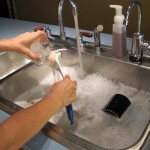Wash delicate dishes by hand or with dishwasher?
Join a growing trend among homeowners to embrace green values during Christmas. Today’s topic: Give yourself a break on water and power expense with this holiday clean-up strategy.
With wonderful tasty meals and special champagne toasts, dirty dishes pile up. Unless frozen pipes burst, we pretty much ignore our water use during the holidays, don’t we?
Depending upon how you deal with clean up, when water is wasted your dollars will literally go down the drain. Plus, excessive hot water use while dish washing spikes our power bills.
But how do you deal sensibly with delicate crystal flutes and Grandma’s bone china that should be hand-washed?
Here’s my two-part strategy:
Part 1: Clean most dirty dishes in your dishwasher
It may seem crazy, but home economists say it takes less water using your dishwasher than hand washing. Since holiday visiting time is valuable, max out use of your automatic appliances whenever possible.
Because of tough new Energy Star standards, each load costs less to run, but you may trade off with a longer cycle time. Energy Star dishwashers with soil sensors, though, match the cycle time to the load which give you the best deal saving time, energy and water. One of the quietest of the newest types is the Kenmore Pro HE 1317[3]
Another model that got good reviews for the price is the Whirlpool Gold GU2300XTV[Q]. Large pots and pans fit well, the silverware stores upon the door, and even has a delayed start option.
Consider phosphate-free Finish Quantum or Finish Powerball Tabs dishwasher detergents which have given especially good cleaning results.
Part 2: Delicate glassware and dishware
Steps to conserve water and save money while washing dishes by hand:
- With hot water on low, begin to fill one side of a double sink with soapy hot water about ½ inch deep.
- Use a phosphate and petroleum-free cleaner like Seventh Generation or J.R.Watkins.
- Empty glasses; scrape off plates into the trash (not your sink disposal). Food waste in the plumbing can cause unexpected neighborhood sewer backups.
- Start with glassware and wash in soapy water – then as the water level rises repeat with specialty utensils and dishes.
- Rinse each dish so that the tap water slowly accumulates in the wash water below. Turn off the tap, not leaving the water running when the sink is about half full.
- Stopper the empty second sink.
- Place the remaining soapy dishes in the second sink until full. Then, spray rinse with cool running water. Once water starts accumulating, it’s easy to dunk and rinse smaller items without any additional water.
- When done, keep that rinse water in the second sink for other random rinse uses.
Last Christmas we had 17 people staying in the house for a week. Seems all we did was cook, eat and clean.
In January my utility bill spiked and I knew it was in large part because the hot water was running continuously while a bunch of dishes were hand washed. I’d hate to have that same thing happen to you.
